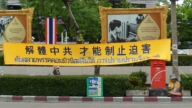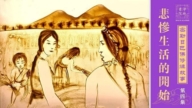【新唐人2011年5月17日讯】中国有着悠久的历史文化,而中国人常以“聪明”而自豪。但最近有西方舆论认为,中国在走向低智商社会,原因是中国人读书少。不过中国的学者指出,是因为中共当局的禁锢,导致中国没有好书可看。
美国《华尔街日报》日前发表的文章《中国在走向低智商社会吗?》提到,虽然中国人作为个体而言大都自认为智商很高,但中国的社会集体智商状况却非常令人担忧。
文章强调,现在中国人的读书习惯越来越差,对真正的知识和真理缺乏追求,而是更加趋于实用。文章认为,如果一个民族失去了读书的耐心,很难想像还会有追求更高境界的动力。
原山东大学教授、经济资讯管理系主任孙文广向《新唐人》表示,中国人现在不爱读书,原因是中国现在的书不好看。
孙文广:“中国大陆所有的出版局都是国有的,出版一本书经过上头的严密的审查,在这样一种监控条件下,出版社当然就萎缩了、单一了。一元化看多了就烦了,不想去看了,这样的话,读书的就少了,影响人的智商了,智商下降,就变成愚昧。这是一种愚民政策的结果。”
孙文广曾在香港出版《百年祸国》等4本书,因内容敏感遭到大陆当局的封杀。而中国著名作家廖亦武则自认是出版“杀手”。他的作品不仅在国内被禁,现在甚至被告知不能在海外发表作品。
廖亦武撰写的《中国底层访谈录》采访了300多名底层受访者的人生经历,牵动人心,被北京政府禁发之后,它的盗版一直走俏中国大陆地摊,至少有六、七个版本流通在社会上。
原《毕节日报》记者李元龙认为,当局害怕人们知道真相,所以严格控制书本的发行和内容。
李元龙:“就是怕人家知道多的资讯,知道它不愿意让别人知道的资讯以后,对它不利。凡是搞阴谋诡计,靠阴谋手段来维持统治的独裁政府,它就怕人们看到其他,与它所谓的主旋律以及党报党刊内容不一样的东西。
中共当局一方面严密控制出版,另一方面对党报党刊的发行订阅,每年都要求全国各地作为政治任务必须完成。
孙文广:“以前有一句话,就是统一思想。把大家的思想统一在中共当局的意识形态下面,哪个国家是帝国主义,大家就仇恨它;它说,我们自己是多么伟大,大家也相信。这样天长日久,就产生一种愚昧。愚昧的结果呢,就是社会放慢了前进的脚步,就会落后。”
据了解,世界上最爱读书的国家之一以色列,人均每年读书64本,在百年来的诺贝尔奖获奖者中,犹太人就占了近20%。另外一个国家匈牙利,平均每人每年购书20本,诺贝尔奖得主多达14位。相比之下,中国人每人每年读书还不到5本。
新唐人记者李静、李谦、萧宇采访报导。
Is China A Low IQ Society?
As one of the world’s four ancient civilizations,
China has a long history of culture,
and Chinese people are proud of their intelligence.
But recently, some Western media think China
is moving toward a low-IQ society,
because the Chinese people read less.
Scholars point out, however, that this is because
there are no good books in China to read
due to the Chinese regime’s control on publications.
US Wall Street Journal recently published an article
“Will China Go to A Low IQ Society?” It mentions
that many Chinese have high IQs as individuals,
but the collective IQ of Chinese people is worrying.
The article emphasized that the reading habits
of Chinese people are getting worse.
They lack a pursuit of knowledge and truth,
but have become more practical. The article said
that if a nation loses patience to read,
it is hard to imagine that they will have
any motivation to pursue higher realms.
Former Shangdong University professor
Sung Wenguan told NTD that the Chinese
do not like to read as the books are not interesting.
Sung Wengguang: “All publishers in China
are state-owned. Each book goes through
a strict review process before it is published.
Under such a situation, publishers shrink for sure.
People don’t want to read books with the same tone,
therefore less people want to read,
IQ declines, and people become ignorant.
This is a result of obscurantism.”
Sun Wenguang published four books in Hong Kong,
including “Destroy the Country for 100 Years".
Because of sensitive content, the books are banned
by mainland authorities. Famous Chinese writer
Liao Yiwu calls himself a “killer of publishers.”
His work is not only banned in China,
but he was also told not to publish anything abroad.
Liao’s “Interview with China’s Bottom Classes”
is about the life experiences of more than 300 people
at the bottom of the social class.
After it was forbidden by the Beijing government,
it became very popular at small stands
with six or seven different versions of the book sold.
Former Bijie Daily reporter Li Yunlong
thinks that authorities are afraid of people
knowing the truth, so they strictly control
the publication and contents.
Li Yunlong: “They are in fear of people
knowing more information, and accessing things
that the regime believes are negative.
Totalitarian governments rely on tricks
and conspiracy to maintain their rule.
They are afraid of people seeing other information
different from its so-called ‘main theme’
on the party newspapers and journals.”
On one hand, the Chinese Communist Party (CCP)
authorities tightly control publications;
on the other hand, they require people to subscribe
to party newspapers and journals as a political task.
“In the past there was a saying of unified thinking,
which means to unify everyone’s thinking
following the ideology of the Chinese authorities.
People hate imperialists and think how great we are.
Over time, it leads to a childish ignorance,
Which drags us down.”
It is said that people in Israel are among those
who like to read books most, with an average
of 64 books read per person each year.
In the past hundred years, Jewish people
accounted for nearly 20% of Nobel Prize winners.
The average Hungarian reads 20 books per year,
and Hungarians have as many as
14 Nobel Prize winners.
In contrast, Chinese people’s average is less than
five books per person per year.
NTD reporters Li Jing, Li Qian and Xiao Yu






























